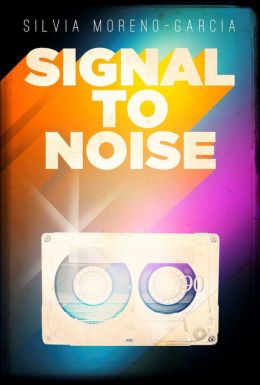Silvia Moreno-Garcia is to date perhaps best known as an anthology editor and the publisher of the small Canada-based Innsmouth Free Press, and as the author of two collections of short fiction. Signal to Noise, released this month by Solaris Books, is her debut novel: and a strangely compelling entry in the novel stakes it is, at that.
Spoilers ahead.
There is something oddly elegiac about Signal to Noise. The narration comprises two strands. One strand is set in 2009, when Meche, the protagonist, here in her thirties, returns to Mexico City after two decades away for the funeral of her estranged father — a man with large dreams who attained none of them and died alone in a small apartment. The other strand is set in 1988, when an awkward and out-of-place fifteen-year-old Meche, negotiating the vagaries of high school with two similarly outcast friends, Sebastian and Daniela, discovers how to use her collection of vinyl records to do magic through music.
In many ways Signal to Noise is drawing more from a mainstream literary genre palette than your standard fantasy one: this is a fantasy novel set in an urban area, but to describe it as urban fantasy screws with generic category boundaries. This isn’t magic realism, but how the narrative uses the magic owes a great deal to magic realism in its tone. The magic, here, seems to reify in a sense Meche’s potential for power and success: it sits as the outward representation of her drive.
I say “oddly elegiac” even though Signal to Noise doesn’t exactly lament anything. Tonally, it has the feel of elegy, of reflection on past time. The 1988 narrative strand is structured as a tragedy. Meche’s parents’ marriage is disintegrating. The magic gives Meche power and control, to a certain degree: she wants to use it to fit in, to belong, to have influence, and it begins to drive a wedge between her and Sebastian and Daniela. When Meche begins to use the power of the magic to punish those who’ve wronged her, when she uses it to punish Sebastian — and nearly kills him — the consequences deprive her of the power to cast spells and the friendship of Daniela and Sebastian, and lead to her grandmother’s stroke and her departure from Mexico City. The 2009 narrative strand, Meche’s return to Mexico City, is introspective, personal, with no magical element whatsoever: it becomes a meditation on growth or lack thereof, understanding oneself and other people, and connections.
Moreno-Garcia has a solid and convincing prose style, robust and subtle in all the right places. Her characters are fully realised people, never less than believable in their own right. Where Signal to Noise falls down is in balancing its two narrative strands: while internally each has its own sturdy pacing and development, structurally, they don’t support each other as well as they really need to in order to bring more dynamic tension into the novel as a whole, and to reinforce the thematic arguments in each. But despite this flaw, Signal to Noise is a successful debut, and a very interesting book.
It’s not really my sort of thing: much as I love music, I’ve never really liked novels that revolved around it, or involved music-magic. And I’m not so fond of the introspective tone of the 2009 narrative strand. Which is not to say that it’s not a good book: what it does, it is doing very well. But what it’s doing isn’t really a thing that greatly appeals to me. It’s too quiet and too… well, 1980s… to really hook into my enthusiasms.
If this is your sort of thing, it will work for you. As for me, I’m interested in seeing what Moreno-Garcia does next.
Signal to Noise is available now from Solaris.
Liz Bourke is a cranky person who reads books. Her blog. Her Twitter.










